Diplomatic Bluebook 2021
Chapter 2
Japan's Foreign Policy by Region
4 Southeast Asia
(1) Indonesia
As a major country in the Southeast Asia region with the fourth largest population in the world (at approximately 267 million people), Indonesia plays a leading role in ASEAN. In addition, it has been showing initiative for various challenges facing the international community as a G20 member.
President Joko's second administration, which started in October 2019, is a stable administration where the ruling party controls approximately 74% of the seats in the People's Consultative Assembly, and, as priority issues, is implementing (1) infrastructure development, (2) human resources development, (3) investment promotion, (4) government reforms, and (5) appropriate execution of the state budget. Additionally, following the spread of COVID-19, since spring, large-scale social restrictions and economic measures are being implemented. With regard to investment promotion, the Government of Indonesia enacted an omnibus law on job creation in November for the purpose of attracting investment, which collectively amends related laws in 11 fields, such as employment, investment and simplification of authorization procedures for business.
Japan is actively promoting cooperation with Indonesia in the fields of infrastructure development and human resources development, which are priorities of the second Joko administration, and also cooperating to strengthen Indonesia's health and medical systems and as measures against COVID-19, including the provision of medical equipment, financial support loans and the provision of Avigan.
As for high-level bilateral exchanges with Japan, Foreign Minister Motegi visited Indonesia in January and held a Japan-Indonesia Ministerial-Level Strategic Dialogue. Even after the worldwide spread of COVID-19 restricted travel, two summit telephone calls and two foreign ministers' telephone calls were held, and opinions were closely exchanged on COVID-19 measures. In October, Prime Minister Suga visited Indonesia as part of his first overseas visit since taking office, and at the Summit Meeting with President Joko, Prime Minister Suga confirmed coordination in politics, security, the economy, infrastructure development, oceans, disaster prevention, etc., and confirmed the further strengthening of cooperation on regional issues such as the South China Sea and North Korea (see the article on page 74).
(2) Cambodia
Cambodia is located at a strategic point along the Southern Economic Corridor, and is a key country in strengthening connectivity and narrowing the development gap in the Mekong-Southeast Asia region. Under a development policy centered on strengthening governance, Cambodia has continued to grow at an average rate of 7% for the past 20 years, and is aiming to become an upper middle-income country in 2030. In 2020, the sewing, tourism and construction industries, which are the driving forces for Cambodia's growth, declined due to COVID-19, and it is expected that growth will be negative for the first time since the establishment of the Royal Government of the Kingdom of Cambodia in 1993.
In 1992 Cambodia was the first country to which Japan deployed full-scale PKO and is the starting point for Japan's “Proactive Contribution to Peace.” Bilateral relations, which have been cultivated based on cooperation in peace and subsequent reconstruction and development, were elevated to a “Strategic Partnership” in 2013, and are still deepening. In August 2020, Foreign Minister Motegi visited Cambodia as the first overseas dignitary since the spread of COVID-19, and he made a courtesy call to Prime Minister Hun Sen and held a Foreign Ministers' Meeting with Minister of Foreign Affairs Prak Sokhonn. A Foreign Ministers' telephone call was also held in October.
Regarding domestic affairs, the ruling Cambodian People's Party monopolized all seats in the 2018 National Assembly elections as the largest opposition, the Cambodia National Rescue Party, was dissolved the previous year. In a statement at the end of 2018, the Cambodian government announced measures to improve the democratic environment, such as promoting domestic dialogue and expediting judicial proceedings, and has been proceeding since then. In January 2020, trial of opposition leaders who had been arrested in 2017 began, but was adjourned due to COVID-19 since March.
Japan is advancing efforts such as inviting young politics-oriented Cambodians including members of the ruling and opposition parties to support Cambodia's democratic development, and held the fourth round of invitations in January.
In the Khmer Rouge Tribunal, which Japan has been supporting for many years, it was confirmed in August that one suspect in the investigation would not be prosecuted, and if the other two cases under investigation are not prosecuted then it is highly likely that the tribunal will be completed with the ruling on the appeal of case 2-02, in which the defendant is a former head of state, scheduled for the end of 2022.
(3) Singapore
Singapore is the most economically advanced country within ASEAN. Based on its omnidirectional foreign policy, the country maintains friendly relations with major countries including the U.S. and China.
In Singapore, although the People's Action Party (PAP), led by Prime Minister Lee Hsien Loong, won 83 of the 93 seats in the election in July and continues to occupy the overwhelming majority of seats in the Parliament, the PAP's overall share of the vote was only 61.24%, which was lower than the 69.86% in the previous 2015 election.
In 2020, although opportunities for travel decreased due to the impacts of COVID-19, high-level exchanges between the two countries are continuing through a summit telephone call and two foreign ministers' telephone calls. In August, Foreign Minister Motegi visited Singapore as his first visit to Asia after the spread of COVID-19, made a courtesy call to Prime Minister Lee Hsien Loong, and had a meeting with Minister for Foreign Affairs Vivian Balakrishnan. At the meeting, both countries agreed that, as gradual measures to resume international travel after strengthening border measures because of COVID-19, they would aim to start both a “Business Track” enabling business activities with a limited range of activities for 14 days after entry, and a “Residence Track” that is mainly focused on expatriates who are staying for the medium- to long-term.
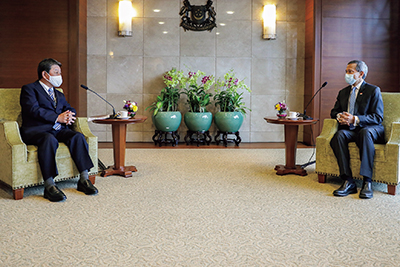 Japan-Singapore Foreign Ministers' Meeting
Japan-Singapore Foreign Ministers' Meeting(August 13, Singapore)
The two countries have worked together to provide developing countries with technical assistance through the “Japan-Singapore Partnership Program for the 21st Century (JSPP21),” which was signed in 1997. To date they have provided training approximately 400 times with roughly 7,000 participants from ASEAN countries and other regions.
The Japan Creative Centre (JCC), which was opened in Singapore in 2009 as a platform to promote Japanese culture, distributed a variety of information and held events while taking measures against COVID-19 infections.
(4) Thailand
Thailand is one of the original member states of the Association of Southeast Asian Nations (ASEAN), which was born of the “Bangkok Declaration” in 1967. It is located in the center of the Mekong region and is a geopolitically important country.
Japan and Thailand are said to have a long history of exchanges over 600 years, and have traditionally maintained a friendly relationship. The establishment of diplomatic relations dates back to the “Declaration of Amity and Commerce between Japan and Siam (Declaration of Amity)” in 1887. The current bilateral relationship is a “Strategic Partnership” in which both countries cooperate not only bilaterally, but also in the region and the international community. In addition, as a result of many years of official development assistance and investment by private companies from Japan, Thailand has become a major production center for Japanese companies, including the automobile industry, and today Thailand is an indispensable part of the Japanese economy as a part of the global supply chain, with more than 5,000 Japanese companies operating in Thailand and more than 70,000 Japanese nationals living in Thailand.
In 2013, following the introduction of a visa exemption measure for Thai nationals for short-term stay activities, the number of Thai tourists visiting Japan rapidly increased, and was approximately 1.32 million in 2019, before the spread of COVID-19. Thai nationals visiting Japan are ranked sixth in the number of travelers to Japan by country. In January, Foreign Minister Motegi visited Thailand, made a courtesy call to Prime Minister Prayut Chan-o-cha, and met with Minister of Foreign Affairs Don Pramudwinai. Although there was no travel of dignitaries after this visit due to the restrictions by the spread of COVID-19, high-level exchanges were continued through three telephone calls between Foreign Minister Motegi and Minister of Foreign Affairs Don (note: concurrently serving as Deputy Prime Minister as well from August) across May, June and October.
On the domestic front of Thailand, against a background of economic and social disparities and the deterioration of the economic situation due to the spread of COVID-19, protests against the government and the monarchy have become active, especially among young people, and the unstable situation is continuing.
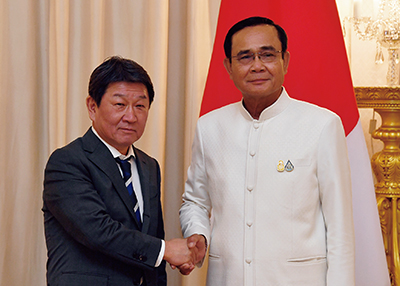 Courtesy call to Thai Prime Minister Prayut Chan-o-cha by Foreign Minister Motegi (January 7, Bangkok, Thailand)
Courtesy call to Thai Prime Minister Prayut Chan-o-cha by Foreign Minister Motegi (January 7, Bangkok, Thailand)(5) Timor-Leste
Timor-Leste, the first country to achieve independence in the 21st century (in 2002), is a strategically important country in the Indo-Pacific region, and is situated in an important sea lane between Australia and Indonesia. The country has realized peace and stability with the support of the international community and has been building the nation based on democracy. As its economy is highly dependent on natural resources such as petroleum and natural gas, the country has been working to diversify its industry as a matter of the highest national priority.
There are continuing efforts to coordinate with ASEAN countries so that Timor-Leste can join ASEAN, which is the most important foreign policy issue for Timor-Leste.
Domestically, the ruling party and President Francisco Guterres Lu-Olo continued to face off with each other, and national affairs were stagnant, but since January new coalitions have been sought between the political parties, trigged by the division within the ruling coalition. As a result, by May 29 the VIII Constitutional Government had been formed by a new four-party National Assembly majority, which included the People's Liberation Party (PLP) led by Prime Minister Taur Matan Ruak as well as the Revolutionary Front for an Independent East Timor (Fretilin) led by President Lu-Olo, and the confrontation was resolved as a result of the cabinet reshuffle.
In January, Parliamentary Vice-Minister for Foreign Affairs Nakayama Norihiro visited Timor-Leste for a ceremony to celebrate the 20th anniversary of Japan's support for Timor-Leste, and also attended a ceremony for the completion of a new school building for the Faculty of Engineering Building of The National East Timor University and for the Dili Port ferry terminal, which were constructions via Japanese ODA. In doing so, together with President Lu-Olo, Prime Minister Ruak, and Minister for Foreign Affairs and Cooperation Dionisio Babo, the two sides strengthened bilateral cooperation in areas such as education, human resource development, people-to-people exchanges, as well as economy and infrastructure. They also enhanced the trilateral cooperation among Japan, Timor-Leste and Indonesia in the maritime field and others, as well as regional coordination.
In response to COVID-19, Japan is also providing support, such as the provision of medical equipment, to strengthen the health and medical system.
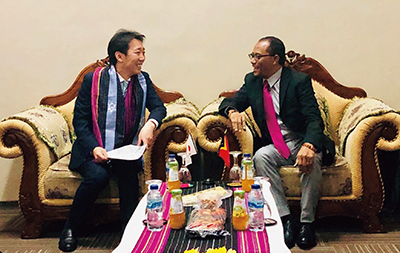 Parliamentary Vice-Minister for Foreign Affairs Nakayama meeting Minister for Foreign Affairs and Cooperation Babo (January 14, Dili, Timor-Leste)
Parliamentary Vice-Minister for Foreign Affairs Nakayama meeting Minister for Foreign Affairs and Cooperation Babo (January 14, Dili, Timor-Leste)(6) The Philippines
The Philippines has consistently maintained a high growth rate of 6% or more since 2012, but in 2020 a negative growth rate is expected due to the impact of reduced remittances from overseas workers and restrictions on domestic economic activities that were introduced because of the spread of COVID-19. President Rodrigo R. Duterte has gained high public confidence for new COVID-19 countermeasures, and has demonstrated strong leadership in responding to priorities such as anti-corruption, security and counterterrorism. As for the Mindanao Peace Process, the work for establishing an autonomous government for 2022 is continuing, and as of March, 12,000 people, equivalent to 30% of the Moro Islamic Liberation Front (MILF) soldiers, have retired and relinquished their weapons.
In order to further strengthen the “Strategic Partnership” between Japan and the Philippines, in January Foreign Minister Motegi visited Manilla, paid a courtesy call to President Duterte, met with Secretary of Foreign Affairs Teodoro Locsin and with Secretary of Finance Carlos Dominguez, visited the Philippine Coast Guard, and inspected a patrol boat whose construction the Government of Japan had supported through an ODA yen loan. Even after international travels were disrupted by the impacts of COVID-19, there were active exchanges among dignitaries, and two summit telephone calls and a foreign ministers' telephone call were held.
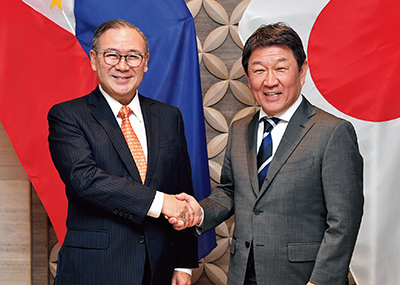 Japan-Philippines Foreign Ministers' Meeting
Japan-Philippines Foreign Ministers' Meeting(January 9, Manila, Philippines)
On the security front, in August a contract to deliver warning and control radars to the Philippines was signed as the first overseas transfer of domestically-produced finished equipment, further promoting cooperation. Meanwhile, on the economic front, in January the Government of the Republic of the Philippines decided to remove all import restrictions on Japanese food products, which had been in place after the Great East Japan Earthquake. Furthermore, in October, Japan continued to provide powerful support to the Government of the Republic of the Philippines' robust infrastructure development policy, “Build, Build, Build,” by way of holding the 10th Japan-Philippines High Level Joint Committee on Infrastructure Development and Economic Cooperation, a mechanism that was launched to steadily implement Prime Minister Abe's January 2017 pledge to render public and private assistance to the tune of 1 trillion Japanese yen over five years. In addition, Japan is cooperating in providing medical equipment, financial support loans and Avigan tablets for disaster response and COVID-19 countermeasures.
(7) Brunei
Its abundance in natural resources has enabled Brunei to realize a high economic standard and generous social welfare. As such, the country enjoys political and economic stability. Although it is a constitutional monarchy and has a Legislative Council, the Sultan concurrently serves as the Prime Minister, Minister of Finance and Economy, Minister of Defence and Minister of Foreign Affairs, and therefore holds an impressively strong authority. Located in the center of Southeast Asia, the country is one of the claimant countries in the South China Sea and has adopted a balanced diplomacy built on the pillar of promoting ASEAN unity and centrality.
Although Brunei's economic growth rate is projected to remain positive in 2020, supported by a joint oil refining venture with China, the Government of Brunei is aiming for economic diversification to avoid overreliance on energy resources.
Since Japan and Brunei established diplomatic relations in 1984, the two countries developed excellent bilateral relations in various areas that include politics, defense, economy, culture and personal exchanges. In addition, the two countries enjoy a close relationship between the imperial and royal families, and His Majesty Sultan Haji Hassanal Bolkiah visited Japan in October 2019 to attend the Ceremony of the Enthronement of His Majesty the Emperor. Brunei is an important country for the stable supply of energy resources to Japan. Around 60% of Brunei's liquefied natural gas (LNG) exports are bound for Japan, and LNG from Brunei makes up around 5% of the total LNG import to Japan. Japan has decided to support Brunei, which will become the Chair of ASEAN in 2021, to improve its counter-terrorism capabilities through the United Nations Office on Drugs and Crime (UNODC).
(8) Viet Nam
Located next to sea lanes in the South China Sea and sharing a long border with China, Viet Nam is a geopolitically important country. Given that the country embraces the third largest population in Southeast Asia, and is experiencing a surge in the number of people in middle-income brackets, Viet Nam is a promising market. The country is currently striving to achieve stable economic growth through the stabilization of the macroeconomy including control of inflation, the promotion of foreign investment by the development of infrastructure and the improvement of the investment environment. Moreover, the Government has been engaging actively in administrative reform and anti-corruption measures. In 2020, Viet Nam served as the ASEAN chairman and as a non-permanent member of the UN Security Council, expanding its role in the international community.
Japan and Viet Nam have been advancing cooperation in a variety of areas under the Extensive Strategic Partnership for Peace and Prosperity in Asia. High level officials have made frequent visits to each country. In January, Foreign Minister Motegi visited Viet Nam, met with Prime Minister Nguyen Xuan Phuc, with Deputy Prime Minister and Minister of Foreign Affairs Pham Binh Minh, and with Minister of Industry and Trade Tran Tuan Anh. In March and June telephone calls were held between Foreign Minister Motegi and Deputy Prime Minister and Minister of Foreign Affairs Minh, and in May and August telephone calls were held between Prime Minister Abe and Prime Minister Phuc. In October, in addition to a telephone call between Prime Minister Suga and Prime Minister Phuc, Prime Minister Suga visited Viet Nam as his first overseas visit since being inaugurated. During his visit to Viet Nam, Prime Minister Suga and Prime Minister Phuc agreed in a summit meeting to begin operating a “Business Track” and to resume regular two-way passenger flights in order to recover from COVID-19. Additionally, Prime Minister Suga met with General Secretary and President Nguyen Phu Trong, Chairwoman of National Assembly Nguyen Thi Kim Ngan, and President Pham Minh Chinh of the Viet Nam–Japan Parliamentary Friendship Association, and gave a policy speech at the Vietnam-Japan University, wherein he declared that Japan would continue to lead contributions to regional peace and prosperity as an “Indo-Pacific State” (see the article on page 74).
Prime Minister Suga Visits Viet Nam and Indonesia
From October 18 to 21, Prime Minister Suga visited Viet Nam, which held the ASEAN Presidency in 2020, and Indonesia, a core country in ASEAN, as the first overseas visits since his inauguration. During the visits he deepened Japan's relationship of trust with ASEAN, which is both a friend and a Strategic Partner, and the trip was also an important opportunity to declare Japan's determination to steadily realize a “Free and Open Indo-Pacific (FOIP)” while in close cooperation with ASEAN countries, which are critical to realizing FOIP.
During his visit to Viet Nam, Prime Minister Suga held a summit meeting with Prime Minister Phuc, and agreed to begin operation of a “Business Track” and to resume regular two-way passenger flights in order to recover from COVID-19. The two leaders also agreed to strengthen cooperation between Japan and Viet Nam, such as by diversifying supply chains and supporting Vietnamese residents in Japan who are facing difficult living situations amidst the COVID-19 epidemic. Additionally, they confirmed the strengthening of bilateral relations, such as cooperation in the security field, including the agreement in principle on the transfer of defense equipment and technology, economic cooperation such as infrastructure development, disaster prevention and cooperation in the agriculture field. Furthermore, Prime Minister Suga and Prime Minister Phuc confirmed that they would work closely on the regional situation and fully support the ASEAN Outlook on the Indo-Pacific (AOIP), which has many essential similarities with FOIP.
During his visit, Prime Minister Suga also had a meeting with General Secretary of the Communist Party of Viet Nam and President Trong and Chairwoman of National Assembly Ngan, and received a courtesy call from President Chinh of the Viet Nam–Japan Parliamentary Friendship Association. Additionally, an exchange of opinions with students was conducted at the Vietnam-Japan University, and Prime Minister Suga provided a foreign policy speech for the first time since his inauguration with “building together the future of the Indo-Pacific” as the theme. Prime Minister Suga's speech confirmed the strong partnership between Japan and ASEAN through cooperation on connectivity and human resources development. He also emphasized that the AOIP and FOIP share essential principles, that Japan fully supports AOIP, and the importance of the rule of law. Japan-Viet Nam relations are formed through a “Strategic Partnership” of 16 agreements, etc., in a wide range of public and private fields, and taking the opportunity of Prime Minister Suga's visit, the two countries praised the dramatic development that has resulted across the board, such as in politics, the economy, culture and person-to-person exchanges.
In Indonesia, following the visit to Viet Nam, Prime Minister Suga had a summit meeting with President Joko, exchanged opinions with Japanese companies, paid a courtesy call to former Japanese students, and offered flowers at the Kalibata Heroes Cemetery.
At the Japan-Indonesia Summit Meeting, Prime Minister Suga conveyed Japan's full support for AOIP, which shares many essential points with FOIP, and both leaders agreed to cooperate as maritime states toward the realization of a free and open maritime order. Additionally, they agreed on cooperation in the political and security fields and on strengthening cooperation to improve the investment environment in Indonesia, including the early implementation of a Foreign and Defense Ministers' Meeting (“2+2”), the promotion of remote island development, infrastructure cooperation and human resources development, and expanding cooperation between the two countries to recover from COVID-19, including by strengthening the health sector and supply chains.
As an “Indo-Pacific State,” Japan will continue to work with ASEAN to create a peaceful and prosperous future for the Indo-Pacific region.
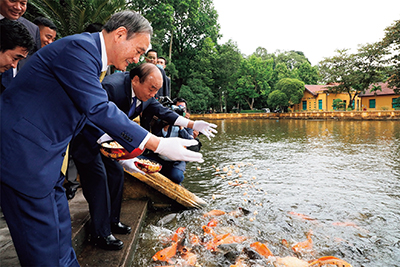 Prime Minister Suga visiting Viet Nam
Prime Minister Suga visiting Viet Nam(October; Photo: Cabinet Public Relations Office)
Viet Nam has essentially been a country with great affinity toward Japan. The number of Vietnamese visiting Japan grew from about 40,000 in 2011 to over 490,000 in 2019. The number of Vietnamese living in Japan rose from about 40,000 in 2011 to about 420,000 in June 2020, the third largest group of foreign residents after China and South Korea.
(9) Malaysia
Comprised of the Peninsular Malaysia of the Malay Peninsula and East Malaysia of Borneo, Malaysia is a geopolitically important country facing the South China Sea and the Strait of Malacca that is situated in a crucial spot in the Indian Ocean and Pacific Ocean. In addition, it is a federal state comprised of 13 states and three federal territories, and also a multiethnic state comprised of Bumiputra (Malay including indigenous peoples) (69%), Chinese (23%) and Indian people (7%), among others.
In February, following the resignation of Prime Minister Mahathir bin Mohamad due to internal administration conflicts, Prime Minister Muhyiddin Yassin has been focusing on anti-COVID-19 measures immediately after he took office in March. Although the impacts of COVID-19 have decreased the bilateral travel of dignitaries when compared to a normal year, a foreign ministers' telephone call was held, and in August Foreign Minister Motegi visited Malaysia as part of his first visit to Asia since the worldwide spread of COVID-19, and had a meeting with Minister of Foreign Affairs Hishammuddin Hussein and Senior Minister and Minister of International Trade and Industry Mohamed Azmin bin Ali.
In terms of specific cooperation between the two countries, Japan and Malaysia agreed to maritime cooperation, such as oil prevention and anti-piracy measures, cooperation amidst the spread of COVID-19, and to begin a “Residence Track” that enables traffic between the two countries of primarily medium- to long-term residents. Additionally, Japan supported Malaysia through the provision of Avigan as well as technical assistance and healthcare supply assistance through international organizations.
In the field of human resources development, through the Look East Policy, which serves as a foundation for the good bilateral relationship between Japan and Malaysia and was proposed by Prime Minister Mahathir in 1981, approximately 26,000 Malaysian people have studied or have been trained in Japan so far. The two countries have been cooperating in making the Malaysia Japan International Institute of Technology (MJIIT), which was opened in September 2011, a base for Japanese-style engineering education in ASEAN countries. In addition, discussions are being held to establish a branch school of the University of Tsukuba in Malaysia, and, if realized, it will be the first overseas branch school to be established by a Japanese university.
On the economic front, Japan is the biggest investor to Malaysia (2019), and roughly 1,500 Japanese companies have been operating in Malaysia, which demonstrates a continued close relationship between the two countries.
(10) Myanmar
In Myanmar, the National League for Democracy (NLD) gained the support of the majority of the people in the 2015 general elections, and a new administration led by State Counsellor Aung San Suu Kyi was inaugurated in March 2016. Since then it has been making efforts for the consolidation of democracy, national reconciliation, and economic development. A general election was held in November 2020, and the NLD once again won an overwhelming victory.
In holding the November 2020 general election, the Government of Japan provided special ink to prevent double voting, dispatched an election monitoring team headed by Sasakawa Yohei, Special Envoy of the Government of Japan for National Reconciliation in the Republic of the Union of Myanmar, and confirmed that free and fair elections were peacefully held.
However, after the general election, the Myanmar Armed Forces repeatedly claimed that there was election fraud, such as duplication of voter list information. The Union Election Commission, the Pyidaungsu Hluttaw legislature, and the Government of Myanmar did not accept these claims, and before dawn on February 1, 2021 the Myanmar Armed Forces detained NLD leaders, including State Counsellor Aung San Suu Kyi and President Win Myint, and a number of legislators. On the same day, the acting president (Vice President of the Myanmar Armed Forces) declared an emergency and delegated full authority to Senior General Min Aung Hlaing. The people opposed the coup d'état by the Myanmar Armed Forces, and disobedience movements spread nationwide. Demonstrations of tens of thousands of people were held on consecutive days in addition to boycotts by bureaucrats at public institutions. In response, the Myanmar Armed Forces announced a curfew in the Yangon region and other areas, and instituted a ban on gatherings of five or more people in public places. The Myanmar Police Force also suppressed the protesters by using water cannons, tear gas and rubber bullets in some cases. Japan has grave concerns that the process of democratization is being undermined, and issued a statement by the Foreign Minister on the day of the coup d'état. Japan strongly urges the Myanmar Armed Forces to immediately cease violent responses to civilians, to release detained officials including State Counsellor Aung San Suu Kyi, and to restore the democratic political system as soon as possible.
Japan has provided full-fledged support to Myanmar's democratic nation building by bringing together the public and private sectors, based on the recognition that the stability and development of Myanmar, which has a historical friendship with Japan, has huge potential for economic development, and its geopolitical importance is directly related to stability and prosperity throughout the entire region. The total contribution of 800 billion Japanese yen from the public and private sectors over five years, which was announced by Prime Minister Abe in 2016, has been implemented in a wide range of fields centered on Yangon urban development, electrical power and transportation infrastructure.
In Myanmar's western state of Rakhine, more than 700,000 people were displaced to Bangladesh due to armed groups' attacks on Myanmar security forces' bases in August 2017. Together with the international community, Japan has been urging the Government of Myanmar to implement the “safe, voluntary, and dignified” return of displaced persons and create an environment conducive to repatriation with the involvement of the UN. In addition, Japan has provided humanitarian aid and infrastructure development assistance to displaced persons and residents in Rakhine State, and has also provided humanitarian aid for displaced persons and host communities on the Bangladesh side. Furthermore, with regard to the allegations of human rights violations in Rakhine State, Japan is urging the Government of Myanmar and the Myanmar Armed Force to investigate and prosecute in a transparent manner based on the recommendations of an independent investigative team established by Myanmar, and to steadily implement the provisional action order by the International Court of Justices.
In Myanmar, achieving peace with ethnic armed groups, who have been fighting against the Myanmar military since its independence, has also been a pressing issue, and until now ten ethnic armed groups had signed the Nationwide Ceasefire Agreement (NCA). In order to achieve a lasting ceasefire and regional stability, Japan is providing indirect support for peace dialogues between stakeholders, centered around Sasakawa Yohei, Special Envoy of the Government of Japan, and is providing reconstruction and development support to improve the lives of local residents and realize a ceasefire.
Japan will take necessary measures while closely monitoring the situation.
(11) Laos
Laos is a land locked country bordering the five countries of China, Myanmar, Thailand, Cambodia and Viet Nam, and therefore is a key country in connecting the Mekong region. Domestically in 2020, while stable administration operation was carried under the one-party rule of the People's Revolutionary Party, preparations were made at the central and local levels for the 11th People's Revolutionary Party Congress, scheduled for 2021. In terms of economy, while working on fiscal stabilization as a top priority, the effects of COVID-19 have impacted tourism and other service industries, and it is predicted that the Laos's economic growth rate, which has maintained a high level of approximately 6~7%, will decline.
In March, Japan and Laos celebrated the 65th anniversary of the establishment of diplomatic relations and marked the fifth anniversary of their “Strategic Partnership.” In August 2020, Foreign Minister Motegi visited Laos as the first overseas dignitary since the spread of COVID-19, and in addition to meeting with Prime Minister Thongloun Sisoulith and Minister of Foreign Affairs Saleumxay Kommasith, in October Foreign Minister Motegi and Minister of Foreign Affairs Saleumxay had a telephone call. Japan and Laos also implemented a variety of cooperative actions in the field of economic cooperation. For financial stabilization support, which was strongly requested by the Government of Laos, policy proposals that would be the results of the support were compiled in January, and cooperation was continued by dispatching experts. Japan has supported the drafting of the Civil Code since 2012, and in May it was enacted, becoming a culmination of many years of legal development support for Laos. When Foreign Minister Motegi visited Laos in August, a ceremony was held for the delivery of medical equipment and materials with grant aid as part of support for measures against COVID-19, and it was decided to implement further grant aid in fields such as teacher training and urban transportation. In this way, steady progress has been seen for the “Japan-Lao PDR Joint Development Cooperation Plan” announced by both leaders in September 2016, and numerous efforts have been made to realize a “Free and Open Indo-Pacific.” Regarding cultural exchange, the “Japan Festival” was held in Vientiane in January, which deepened mutual understanding by the people of both countries.
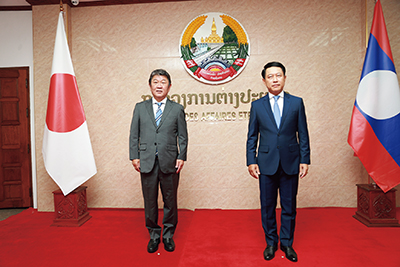 Japan-Laos Foreign Ministers' Meeting (August 23, Laos)
Japan-Laos Foreign Ministers' Meeting (August 23, Laos)